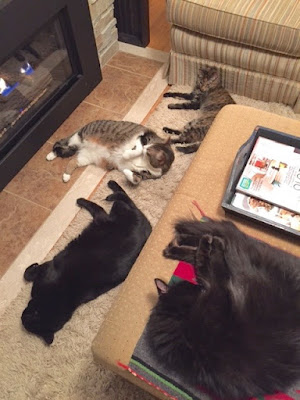Hope you can help as I’m living a big dilemma. I know who my biological mother is, I know who my adopted mother is, I know who my adopted father is but how would I know who my biological father is? When humans are looking for child support they do a DNA test and the “bad guy” ends up paying until the human kitten finishes university or is 21 years old. Well, in most cases we don’t get to live that long so our biological fathers won’t have to supply a daily fresh mouse for the next 21 years!
However, I don’t think it’s fair not to make them bring a mouse once in a while!
My biological mother was rescued when she was very young and very pregnant! I was
one of the kittens in the litter. The human who rescued my mother kept all of
us so I had a very happy kittyhood! But, I wonder ….could that stray coming for
dinner in the backyard be my father? Should I approach him? Ask him for a DNA
test?
George, what cats do in such situations?
Eager to hear from you
Speedy
Dear Speedy,
It's a wise cat that knows its own father. I don't. A fair number of humans don't either: they only think they do. The joy of feline sex is that two or three different toms father a litter. It's nature's way of ensuring diversity. Humans have to have rules about this: we do it naturally. Gingers, blacks, black-and-whites, grey (all shades of) tortoiseshells and tabbies are all brought up as equals.
Forget your father. It's only boring humans care about paternity, and get DNA tests, and worry and upset themselves. It's mothers that count for us. They feed us and teach us. There's no kitten support from our fathers.
Yes, if that stray cat in the backyard looks like you, sniff the air and see if you can recognise a familiar scent. It's the armpit test and some believe cats can recognise their relatives. But that might just be catlore.
Purrsonally I never give my father a second thought. I am Glorious Me and that is all that matters.
George.
Speedy
Dear Speedy,
It's a wise cat that knows its own father. I don't. A fair number of humans don't either: they only think they do. The joy of feline sex is that two or three different toms father a litter. It's nature's way of ensuring diversity. Humans have to have rules about this: we do it naturally. Gingers, blacks, black-and-whites, grey (all shades of) tortoiseshells and tabbies are all brought up as equals.
Forget your father. It's only boring humans care about paternity, and get DNA tests, and worry and upset themselves. It's mothers that count for us. They feed us and teach us. There's no kitten support from our fathers.
Yes, if that stray cat in the backyard looks like you, sniff the air and see if you can recognise a familiar scent. It's the armpit test and some believe cats can recognise their relatives. But that might just be catlore.
Purrsonally I never give my father a second thought. I am Glorious Me and that is all that matters.
George.





